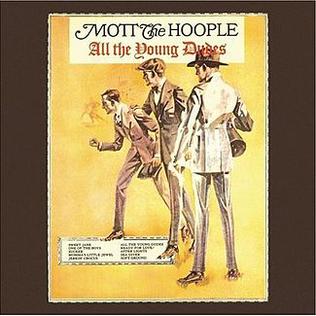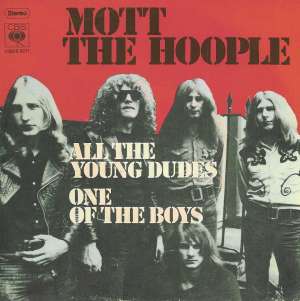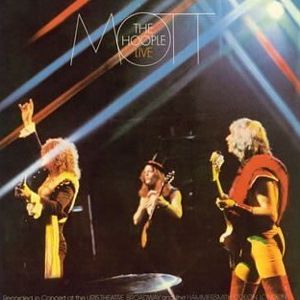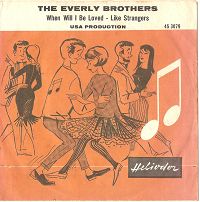Glam rock is a style of rock music that developed in the United Kingdom in the early 1970s and was performed by male musicians who wore flamboyant and feminine clothing, makeup, and hairstyles, particularly platform shoes and glitter, and female musicians who wore masculine clothing. Glam artists drew on diverse sources across music and throwaway pop culture, ranging from bubblegum pop and 1950s rock and roll to cabaret, science fiction, and complex art rock. The flamboyant clothing and visual styles of performers were often camp or androgynous, and have been described as playing with other gender roles. Glitter rock was a more extreme version of glam rock.

Mott the Hoople were an English rock band formed in Herefordshire. Originally known as the Doc Thomas Group, the group changed their name after signing with Island Records in 1969. The band released albums at the beginning of the 1970s but failed to find commercial success. On the verge of breaking up, the band were encouraged by David Bowie to stay together. Bowie wrote the glam-style song "All the Young Dudes" for them, which became a big hit in 1972. Bowie subsequently produced their album of the same name, which added to their success.

Michael Geoffrey Ralphs is an English retired musician, vocalist and songwriter, who was a founding member of rock bands Mott the Hoople and Bad Company.

Luther James Grosvenor is an English rock musician, who played guitar in Spooky Tooth, briefly in Stealers Wheel and, under the pseudonym Ariel Bender, in Mott the Hoople and Widowmaker.

"Satellite of Love" is a song by American musician Lou Reed. It is the second single from his 1972 album Transformer. At the time of its release, it achieved minor US chart success, though it later became a staple of his concerts and compilation albums.

All the Young Dudes is the fifth studio album by the English rock band Mott the Hoople, released in 1972. It was their initial album for the CBS Records label, after three years with Island Records in the UK and Atlantic Records in the United States and Canada.

Mott is the sixth studio album by British rock band Mott the Hoople. It peaked at No. 7 in the UK Albums Chart. It is the last album to feature guitarist Mick Ralphs, and the first without organist Verden Allen; because of Allen's departure, most organ and other keyboard parts are played by Ralphs.

"All the Young Dudes" is a song written by English singer-songwriter David Bowie, originally recorded and released as a single by the English rock band Mott the Hoople in 1972 by Columbia Records. Bowie produced the song, which he had given to the band after they rejected his "Suffragette City". Bowie would subsequently record the song himself. Regarded as an anthem of glam rock, the song has received acclaim and was a commercial success. In 2021, Rolling Stone ranked "All the Young Dudes" number 166 in its list of the 500 Greatest Songs of All Time. It is also one of the Rock and Roll Hall of Fame's 500 Songs that Shaped Rock and Roll.

"Sunshine on My Shoulders" is a song recorded and co-written by American singer-songwriter John Denver. It was originally released as an album track on 1971's Poems, Prayers & Promises and later, as a single in 1973. It went to number one on the Billboard Hot 100 chart in the U.S. in early 1974.

"Saturday Night's Alright for Fighting" (sometimes written "Saturday Night's Alright (For Fighting)") is a song originally recorded by English musician Elton John. John composed it with his long-time songwriting partner Bernie Taupin. It was released on John's best-selling album Goodbye Yellow Brick Road (1973) and as the first single. It has been covered by many artists and featured on motion picture, video game, and television soundtracks.

"Sweet Jane" is a song by American rock band the Velvet Underground; it appears on their fourth studio album Loaded (1970). The song was written by Lou Reed, the band's leader, who continued to incorporate the piece into live performances as a solo artist.

"Roll Away the Stone" is a song written by Ian Hunter, recorded by English rock band Mott the Hoople, and released as a single on the CBS label. On the first version, recorded before Mick Ralphs left the band, Ralphs plays lead guitar and one of the Thunderthighs handles the bridge voice. It was re-recorded by the band for their 1974 album The Hoople, with Ariel Bender on lead guitar and English vocalist Lynsey de Paul singing the vocal bridge.

"The Golden Age of Rock 'n' Roll" is a single by Mott the Hoople, written by Ian Hunter. It is a release from 1974's The Hoople.

Shades of Ian Hunter: The Ballad of Ian Hunter and Mott the Hoople is a compilation album by Ian Hunter, consisting of tracks by Hunter's previous band Mott the Hoople, and solo Hunter tracks as well. It was released in 1979 as a double-LP.

Ian Hunter Patterson is an English singer, songwriter and musician. He is best known as the lead vocalist of the rock band Mott the Hoople, from its inception in 1969 to its dissolution in 1974, and at the time of its 2009, 2013, and 2019 reunions. Hunter was a musician and songwriter before joining Mott the Hoople, and continued in this vein after he left the band. He embarked on a solo career despite ill health and disillusionment with commercial success, and often worked in collaboration with Mick Ronson, David Bowie's sideman and arranger from The Rise and Fall of Ziggy Stardust and the Spiders from Mars period.

Mott the Hoople is the debut studio album by the band of the same name. It was produced by Guy Stevens and released in 1969 by Island Records in the UK, and in 1970 by Atlantic Records in the US. It was re-issued by Angel Air in 2003 (SJPCD157).

Live is a 1974 album by British band Mott the Hoople recorded during their debut US performance at the Uris Theater (Gershwin) on Broadway in Manhattan, New York City, United States, with Queen as the opening act. A remastered and expanded 30th Anniversary Edition was released by Sony BMG on the Columbia label (516051). The release of the album in its original form in 1974 coincided with the announcement of the band's demise and it was, therefore, their final release. It was a single disc album in its original format but the addition of thirteen extra tracks has seen it expand to a double CD package.

"When Will I Be Loved" is a popular song written by Phil Everly of the Everly Brothers, who had a US top-ten hit with it in 1960. Linda Ronstadt covered the song in 1975, and her version was an even bigger hit in the US, peaking at No. 2. Vince Gill also covered it in 1994 on the soundtrack of the film 8 Seconds.

Rock and Roll Queen is a compilation album by the British rock band Mott the Hoople. The album predominantly features selections from the four albums Mott recorded for Island Records in the UK, which were subsequently issued in the US by Atlantic Records. In Canada, the first three were released by Polydor, while Brain Capers was released in Canada by Island.

"A Rock 'n' Roll Fantasy" is the lead single and fourth track from The Kinks' 1978 album Misfits. Written by Ray Davies, the song was inspired by the band's then-tumultuous state at the time, with two members leaving the band during the recording of Misfits. Released as the first single from the album, the track was the band's most successful single in years, reaching number 30.



















